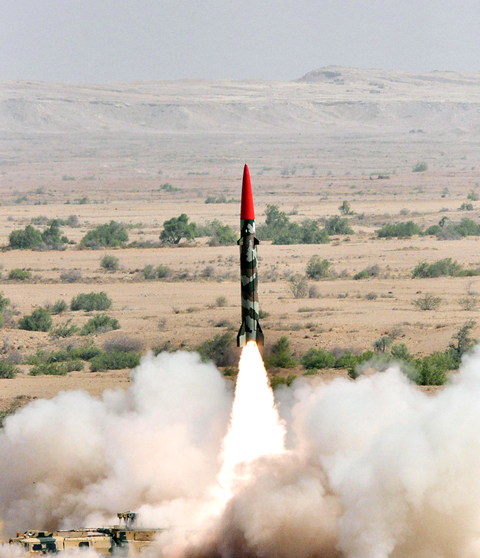Pakistan said yesterday it had tested two missiles capable of carrying nuclear and conventional warheads as Pakistani Prime Minister Yousuf Raza Gilani called for its recognition as a nuclear power.
A statement from the military said the Ghaznavi, with a range of 290km, and the Shaheen 1, which can hit targets up to 650km away, both “successfully hit the target areas.”
Gilani, Chairman of the Joint Chiefs of Staff Committee General Tariq Majid and other senior military and civilian officials witnessed the tests, the military said.

PHOTO: AFP
The prime minister urged the international community to recognize Pakistan as a nuclear power and give it access to civilian nuclear energy.
“It is time for the world to recognize Pakistan as a de jure nuclear power with equal rights and responsibilities,” Gilani said.
He demanded a Nuclear Supplier Group (NSG) waiver for Pakistan saying, “energy is a vital economic security need of Pakistan and nuclear energy is a clean way forward.”
The 45-member NSG controls the export and sale of nuclear technology worldwide. Is rules usually ban trade with states that have not signed the Nuclear Non-Proliferation Treaty. Pakistan is not a signatory.
Pakistan’s arsenal includes short-range, medium and long-range missiles named after Muslim conquerors.
South Asian rivals India and Pakistan — which have fought three wars, two of them over the disputed Himalayan territory of Kashmir — have routinely carried out missile tests since both demonstrated nuclear weapons capability in 1998.

‘UNUSUAL EVENT’: The Australian defense minister said that the Chinese navy task group was entitled to be where it was, but Australia would be watching it closely The Australian and New Zealand militaries were monitoring three Chinese warships moving unusually far south along Australia’s east coast on an unknown mission, officials said yesterday. The Australian government a week ago said that the warships had traveled through Southeast Asia and the Coral Sea, and were approaching northeast Australia. Australian Minister for Defence Richard Marles yesterday said that the Chinese ships — the Hengyang naval frigate, the Zunyi cruiser and the Weishanhu replenishment vessel — were “off the east coast of Australia.” Defense officials did not respond to a request for comment on a Financial Times report that the task group from

DEFENSE UPHEAVAL: Trump was also to remove the first woman to lead a military service, as well as the judge advocates general for the army, navy and air force US President Donald Trump on Friday fired the chairman of the Joint Chiefs of Staff, Air Force General C.Q. Brown, and pushed out five other admirals and generals in an unprecedented shake-up of US military leadership. Trump wrote in a post on Truth Social that he would nominate former lieutenant general Dan “Razin” Caine to succeed Brown, breaking with tradition by pulling someone out of retirement for the first time to become the top military officer. The president would also replace the head of the US Navy, a position held by Admiral Lisa Franchetti, the first woman to lead a military service,

Four decades after they were forced apart, US-raised Adamary Garcia and her birth mother on Saturday fell into each other’s arms at the airport in Santiago, Chile. Without speaking, they embraced tearfully: A rare reunification for one the thousands of Chileans taken from their mothers as babies and given up for adoption abroad. “The worst is over,” Edita Bizama, 64, said as she beheld her daughter for the first time since her birth 41 years ago. Garcia had flown to Santiago with four other women born in Chile and adopted in the US. Reports have estimated there were 20,000 such cases from 1950 to

CONFIDENT ON DEAL: ‘Ukraine wants a seat at the table, but wouldn’t the people of Ukraine have a say? It’s been a long time since an election, the US president said US President Donald Trump on Tuesday criticized Ukrainian President Volodymyr Zelenskiy and added that he was more confident of a deal to end the war after US-Russia talks. Trump increased pressure on Zelenskiy to hold elections and chided him for complaining about being frozen out of talks in Saudi Arabia. The US president also suggested that he could meet Russian President Vladimir Putin before the end of the month as Washington overhauls its stance toward Russia. “I’m very disappointed, I hear that they’re upset about not having a seat,” Trump told reporters at his Mar-a-Lago resort in Florida when asked about the Ukrainian